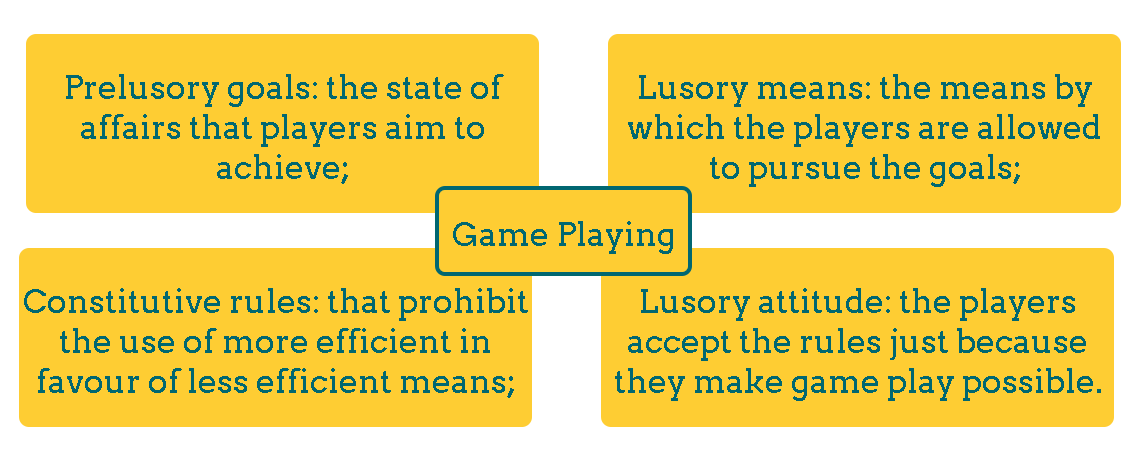1.1 Core concepts in games and gaming
In the following 3 lessons you will be introduced to some core theories and concepts within game studies. One of the most basic questions is how to distinguish between play and non-play. We have many ways of doing this and one of the often-cited concepts is that of the magic circle as a metaphor for describing the complex set of social relations. While within the magic circle, the players adopt a lusory attitude as one of the basic building blocks of games. A player with a lusory attitude accepts the rules of the game just because they make possible such activity. After having read about the magic circle, the lusory attitude and the different rules of games, you will be asked to test your knowledge in the final exercise on Core Concepts in Games sand Gaming.
1.1.3 The lusory attitude
“Playing a game is a voluntary attempt to overcome unnecessary obstacles” is Suits simple definition of a game (Suits, 2005, p. 43), and here we find four necessary elements for game playing:
 |
| The four necessary elements for game playing. |
The lusory attitude also informs Suis definition of playing a game, and we may return to his definition again:
To play a game is to attempt to achieve a specific state of affairs [prelusory goal], using only means permitted by rules [lusory means], where the rules prohibit use of more efficient in favour of less efficient means [constitutive rules], and where the rules are accepted just because they make possible such activity [lusory attitude] (Suits, 2005, pp. 54-5).
Firstly, we can recognize the importance of the prelusory goal: every game has a goal, an objective. This trait of games is often used to differentiate games from pure play: while pure playing is a free form activity with no explicit goal, playing a game is an activity focused on pursuing a goal. However, there are still many activities that focus on pursuing a goal. It can be said that work is also usually an activity focused on pursuing a goal. So what makes a game different from work or other goal pursuing activities?
Let’s look at the next two elements of the definition: lusory means and constitutive rules. Suits argues that to play a game one must create a set of rules that limit the means the player can use to achieve the goal. In addition, one cannot create just any set of goals, but one that is specially crafted to prohibit the use of more efficient in favour of less efficient means to achieving the goal.
And this is when the unnecessary obstacles appear. If one only wishes to achieve any goal, the most obvious course of action would be to select the most efficient way of doing so. However, if one wishes to play a game, then one will deliberately create unnecessary obstacles in the form of rules that will make achieving the goal harder and less efficient. Moreover, to be able to play a game one must approach this obstacles with an essential lusory attitude: the will to voluntarily and consciously accept all the limiting rules of the game, the will to find a path to achieve the goals using sub-efficient means, just because this is what allows one to play the game.
Let us take golf as an example here: In the game of golf, the objective of the game is to place the golf ball in a golf hole 18 times in the fewest attempts possible (the prelusory goal). This would make golf trivial if not for the arbitrary restrictions imposed by the rules of golf, where the players have to use less efficient means such as hitting the ball with a club hundreds of yards away from the hole and having to avoid water, bunkers and trees in the way (constitutive rules). Golf-players accept that these are the rules and they abide by them, or else the game would be far too easy (which is the mindset we approach golf with, the lusory attitude).
Key here is that, when we play a game we follow the rules.
References
- Suits, B. (2005/1978): The Grasshopper. University of Toronto Press, Toronto.

